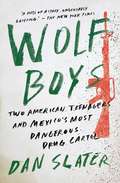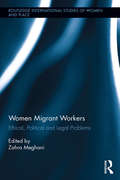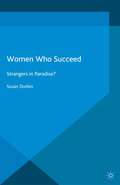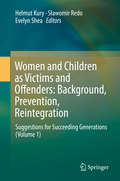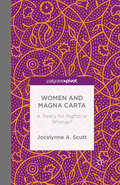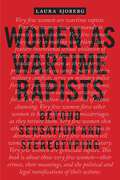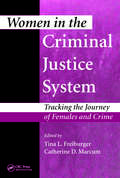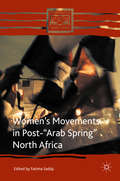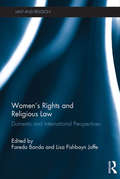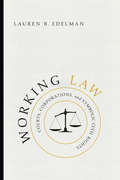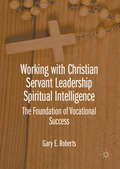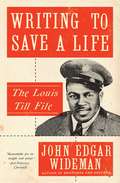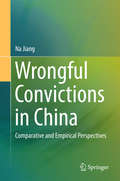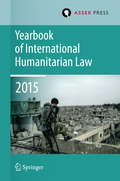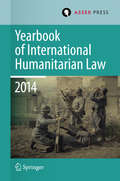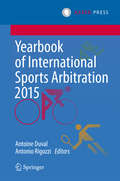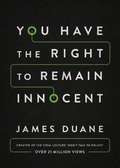- Table View
- List View
With Dogs at the Edge of Life
by Colin DayanIn this original and provocative book, Colin Dayan tackles head-on the inexhaustible world, at once tender and fierce, of dogs and humans. We follow the tracks of dogs in the bayous of Louisiana, the streets of Istanbul, and the humane societies of the United States, and in the memories and myths of the humans who love them. Dayan reorients our ethical and political assumptions through a trans-species engagement that risks as much as it promises. She makes a powerful case for questioning what we think of as our deepest-held beliefs and, with dogs in the lead, unsettles the dubious promises of liberal humanism.Moving seamlessly between memoir, case law, and film, Dayan takes politics and animal studies in a new direction—one that gives us glimpses of how we can think beyond ourselves and with other beings. Her unconventional perspective raises hard questions and renews what it means for any animal or human to live in the twenty-first century. Nothing less than a challenge for us to confront violence and suffering even in the privileged precincts of modernity, this searing and lyrical book calls for another way to think the world. Theoretically sophisticated yet aimed at a broad readership, With Dogs at the Edge of Life illuminates how dogs—and their struggles—take us beyond sentimentality and into a form of thought that can make a difference to our lives.
With Love from the Inside
by Angela PiselAngela Pisel's poignant debut explores the complex relationship between a mother and a daughter, and their quest to discover the truth and whether or not love can prevail--even from behind bars. Grace Bradshaw knows the exact minute she will die. On death row for murdering her infant son, her last breath will be taken on February 15 at 12:01 a.m. Eleven years, five months, and twenty-seven days separate her from the last time she heard her precious daughter's voice and the final moment she'd heard anyone call her Mom. Out of appeals, she can focus on only one thing--reconnecting with her daughter and making sure she knows the truth. Secrets lurk behind Sophie Logan's big house and even bigger bank account. Every day when she kisses her husband good-bye, she worries her fabricated life is about to come crumbling down. No one knows the unforgivable things her mother did to tear her family apart--not her husband, who is a prominent plastic surgeon, or her "synthetic" friends who live in her upscale neighborhood. Grace's looming execution date forces Sophie to revisit the traumatic events that haunted her childhood. When she returns to her hometown, she discovers new evidence about her baby brother William's death seventeen years ago--proof that might set her mother free but shatter her marriage forever. Sophie must quickly decide if her mother is the monster the prosecutor made her out to be or the loving mother she remembers--the one who painted her toenails glittery pink and plastered Post-it notes with inspiring quotes ("100 percent failure rate if you don't try") all over Sophie's bathroom mirror--before their time runs out.From the Hardcover edition.
Witness to a Trial: A Short Story Prequel to The Whistler
by John GrishamA startling and original courtroom drama and short story prequel to THE WHISTLER, from master of the legal thriller John Grisham.A judge's first murder trial.A defense attorney in over his head.A prosecutor out for blood and glory.The accused, who is possibly innocent.And the killer, who may have just committed the perfect crime. 350+ million copies, 45 languages, 9 blockbuster films:NO ONE WRITES DRAMA LIKE JOHN GRISHAM
Witness to a Trial: A Short Story Prequel to The Whistler
by John GrishamA startling and original courtroom drama from New York Times #1 Best Seller John Grisham that is the prequel to his newest legal thriller, The Whistler. An Original E-Short. A judge&’s first murder trial.A defense attorney in over his head.A prosecutor out for blood and glory.The accused, who is possibly innocent.And the killer, who may have just committed the perfect crime.Don&’t miss John Grisham&’s new book, THE EXCHANGE: AFTER THE FIRM!
Wittgenstein and the Creativity of Language
by Jakub Mácha Sebastian Sunday GrèveThis volume is the first to focus on a particular complex of questions that have troubled Wittgenstein scholarship since its very beginnings. The authors re-examine Wittgenstein’s fundamental insights into the workings of human linguistic behaviour, its creative extensions and its philosophical capabilities, as well as his creative use of language. It offers insight into a variety of topics including painting, politics, literature, poetry, literary theory, mathematics, philosophy of language, aesthetics and philosophical methodology.
Wolf Boys: Two American Teenagers and Mexico's Most Dangerous Drug Cartel
by Dan SlaterThe tale of two American teenagers recruited as killers for a Mexican cartel, and the Mexican American detective who realizes the War on Drugs is unstoppable. &“A hell of a story…undeniably gripping.&” (The New York Times)In this astonishing story, journalist Dan Slater recounts the unforgettable odyssey of Gabriel Cardona. At first glance, Gabriel is the poster-boy American teenager: athletic, bright, handsome, and charismatic. But the ghettos of Laredo, Texas—his border town—are full of smugglers and gangsters and patrolled by one of the largest law-enforcement complexes in the world. It isn’t long before Gabriel abandons his promising future for the allure of juvenile crime, which leads him across the river to Mexico’s most dangerous drug cartel: Los Zetas. Friends from his childhood join him and eventually they catch the eye of the cartel’s leadership. As the cartel wars spill over the border, Gabriel and his crew are sent to the States to work. But in Texas, the teen hit men encounter a Mexican-born homicide detective determined to keep cartel violence out of his adopted country. Detective Robert Garcia’s pursuit of the boys puts him face-to-face with the urgent consequences and new security threats of a drug war he sees as unwinnable. In Wolf Boys, Slater takes readers on a harrowing, often brutal journey into the heart of the Mexican drug trade. Ultimately though, Wolf Boys is the intimate story of the lobos: teens turned into pawns for the cartels. A nonfiction thriller, it reads with the emotional clarity of a great novel, yet offers its revelations through extraordinary reporting.
Wolfenden's Witnesses: Homosexuality in Postwar Britain (Genders And Sexualities In History)
by Brian LewisThe Wolfenden Report of 1957 has long been recognized as a landmark in moves towards gay law reform. What is less well known is that the testimonials and written statements of the witnesses before the Wolfenden Committee provide by far the most complete and extensive array of perspectives we have on how homosexuality was understood in mid-twentieth century Britain. Those giving evidence, individually or through their professional associations, included a broad cross-section of official, professional and bureaucratic Britain: police chiefs, policemen, magistrates, judges, lawyers and Home Office civil servants; doctors, biologists (including Alfred Kinsey), psychiatrists, psychoanalysts and psychotherapists; prison governors, medical officers and probation officers; representatives of the churches, morality councils and progressive and ethical societies; approved school headteachers and youth organization leaders; representatives of the army, navy and air force; and a small handful of self-described but largely anonymous homosexuals. This volume presents an annotated selection of their voices.
Women Migrant Workers: Ethical, Political and Legal Problems (Routledge International Studies of Women and Place #16)
by Zahra MeghaniThis volume makes the case for the fair treatment of female migrant workers from the global South who are employed in wealthy liberal democracies as care workers, domestic workers, home health workers, and farm workers. An international panel of contributors provide analyses of the ethical, political, and legal harms suffered by female migrant workers, based on empirical data and case studies, along with original and sophisticated analyses of the complex of systemic, structural factors responsible for the harms experienced by women migrant workers. The book also proposes realistic and original solutions to the problem of the unjust treatment of women migrant workers, such as social security systems that are transnational and tailored to meet the particular needs of different groups of international migrant workers.
Women Who Succeed: Strangers in Paradise
by Susan DurbinThe number of women in senior management remains stubbornly low. Women Who Succeed examines the real life experiences of forty-six senior women who have 'made it' into senior management. It considers the strategies that these women adopted, the support they received and the relationships they formed in building their careers.
Women and Children as Victims and Offenders: Background, Prevention, Reintegration
by Helmut Kury Sławomir Redo Evelyn SheaThis work compiles experiences and lessons learned in meeting the unique needs of women and children regarding crime prevention and criminal justice, in particular the treatment and social reintegration of offenders and serves as a cross-disciplinary work for academic and policy-making analyses and follow-up in developing and developed countries. Furthermore, it argues for a more humane and effective approach to countering delinquency and crime among future generations. In a world where development positively depends on the rule of law and the related investment security, two global trends may chart the course of development: urbanization and education. Urbanization will globalize the concepts of "justice" and "fairness"; education will be dominated by the urban mindset and digital service economy, just as a culture of lawfulness will. This work looks at crime prevention education as an investment in the sustainable quality of life of succeeding generations, and at those who pursue such crime prevention as the providers of much-needed skills in the educational portfolio. Adopting a reformist approach, this work collects articles with findings and recommendations that may be relevant to domestic and international policymaking, including the United Nations Studies and their educational value for the welfare of coming generations. The books address the relevant United Nations ideas by combining them with academic approaches. Guided by the Editors' respective fields of expertise, and in full recognition of academic freedom and "organized scepticism", it includes contributions by lawyers, criminologists, sociologists and other eminent experts seeking to bridge the gap between academic and policy perspectives, as appropriate, against the international background, including the United Nations developments. The second volume opens with Part IV, which presents articles on different kinds of crime prevention. The effectiveness of punishment and, in particular, imprisonment is examined by contrasting it with alternative sanctions and the following questions are raised: Does harsh punishment have a crime preventive effect? What are the side effects of imprisonment on the offenders and their families? Are alternatives, such as restorative justice or mediation, more effective and cheaper? Part V outlines proactive strategies of crime prevention, e. g. for potential sex offenders or in the domain of internet crime. Part VI envisions a more peaceful and inclusive society, which would be realized by improving the protection of women and children in their everyday life, and easing the reintegration of those who have become offenders. The importance of the role played by the UN in formulating these goals is underlined. The volume concludes with an epilogue of the 70th President of the United Nations Economic and Social Council, Martin Sajdik, and a post scriptum of the editors. p>
Women and The Magna Carta: A Treaty for Control or Freedom?
by Jocelynne ScuttOn the eight-hundredth anniversary of the Magna Carta, Women and the Magna Carta investigates what the charter meant for women's rights and freedoms from an historical and legal perspective.
Women as Wartime Rapists: Beyond Sensation and Stereotyping (Perspectives on Political Violence #1)
by Laura SjobergWomen as Wartime Rapists reveals the stories of female perpetrators of sexual violence and their place in wartime conflict, legal policy, and the punishment of sexual violence. Very few women are wartime rapists. Very few women issue commands to commit sexual violence. Very few women play a role in making war plans that feature the intentional sexual violation of other women. This book is about those very few women. More broadly, Laura Sjoberg asks, what do the actions and perceptions of female perpetrators of sexual violence reveal about our broader conceptions of war, violence, sexual assault, and gender?This book explores specific historical case studies, such as Nazi Germany, Serbia, the contemporary case of ISIS, and others, to understand how and why women participate in rape during war and conflict. Sjoberg examines the contrast between the visibility of female victims and the invisibility of female perpetrators, as well as the distinction between rape and genocidal rape, which is used as a weapon against a particular ethnic or national group. Further, she explores women’s engagement with genocidal rape and how some orchestrated the ethnic cleansing of entire regions. A provocative approach to a sensationalized topic, Women as Wartime Rapists offers important insights into not only the topic of female perpetrators of wartime sexual violence, but to larger notions of gender and violence with crucial cultural, legal, and political implications.
Women in the Criminal Justice System: Tracking the Journey of Females and Crime
by Catherine D. Marcum Tina L. FreiburgerThis book provides a rare up-to-date examination of women both as offenders and employees in the criminal justice system. It presents the current state of females in the system through contributions by expert authors. It discusses the criminal justice system‘s reaction to women, as well as the successes and failures of its responses and current and future consequences. It outlines the history of women in the context of the criminal justice system, discusses specific women‘s issues in focused chapters, and highlights key concepts, statistics, and legislation. Each chapter ends with discussion questions to enhance understanding.
Women's Movements in Post-"Arab Spring" North Africa
by Fatima SadiqiUnexpected and transformative revolutions broke off in North Africa and quickly spread to the Middle East and the rest of the world in 2010 and 2011. Spontaneous, leaderless, youth-driven, and backed by social media, these revolutions called for karamah (dignity) and democracy. Centering on women's movements before, during, and after the revolutions, Women's Movements in Post-"Arab Spring" North Africa highlights the broader sources of authority that affected the emergence of new feminist actors and agents and their impact on the sociopolitical landscapes of the region. Until recently, studies of North African women's movements have focused on single aspects of women's achievements at a time. By providing a comparative analysis, this book for the first time sheds light not only on the role that these superstructures play in shaping women's experiences in North Africa, but also on the rich variety of women's responses to authority, and their potential contributions to African and global feminist thought. From the pre-history of the revolutions to their aftermath, the far-reaching historical and national scope of this collection expands the study of women's movements in North Africa beyond national borders, while still paying close attention to local characteristics.
Women's Rights and Religious Law: Domestic and International Perspectives (Law and Religion)
by Fareda Banda Lisa Fishbayn JoffeThe three Abrahamic faiths have dominated religious conversations for millennia but the relations between state and religion are in a constant state of flux. This relationship may be configured in a number of ways. Religious norms may be enforced by the state as part of a regime of personal law or, conversely, religious norms may be formally relegated to the private sphere but can be brought into the legal realm through the private acts of individuals. Enhanced recognition of religious tribunals or religious doctrines by civil courts may create a hybrid of these two models. One of the major issues in the reconciliation of changing civic ideals with religious tenets is gender equality, and this is an ongoing challenge in both domestic and international affairs. Examining this conflict within the context of a range of issues including marriage and divorce, violence against women and children, and women’s political participation, this collection brings together a discussion of the Abrahamic religions to examine the role of religion in the struggle for women’s equality around the world. The book encompasses both theory and practical examples of how law can be used to negotiate between claims for gender equality and the right to religion. It engages with international and regional human rights norms and also national considerations within countries. This book will be of great relevance to scholars and policy makers with an interest in law and religion, gender studies and human rights law.
Working Law: Courts, Corporations, and Symbolic Civil Rights
by Lauren B. EdelmanSince the passage of the Civil Rights Act, virtually all companies have antidiscrimination policies in place. Although these policies represent some progress, women and minorities remain underrepresented within the workplace as a whole and even more so when you look at high-level positions. They also tend to be less well paid. How is it that discrimination remains so prevalent in the American workplace despite the widespread adoption of policies designed to prevent it? One reason for the limited success of antidiscrimination policies, argues Lauren B. Edelman, is that the law regulating companies is broad and ambiguous, and managers therefore play a critical role in shaping what it means in daily practice. Often, what results are policies and procedures that are largely symbolic and fail to dispel long-standing patterns of discrimination. Even more troubling, these meanings of the law that evolve within companies tend to eventually make their way back into the legal domain, inconspicuously influencing lawyers for both plaintiffs and defendants and even judges. When courts look to the presence of antidiscrimination policies and personnel manuals to infer fair practices and to the presence of diversity training programs without examining whether these policies are effective in combating discrimination and achieving racial and gender diversity, they wind up condoning practices that deviate considerably from the legal ideals.
Working with Christian Servant Leadership Spiritual Intelligence: The Foundation of Vocational Success
by Gary E. RobertsThis book addresses how Christian leaders integrate faith into the workplace, through a love-based altruistic system of Christian Servant Leadership Spiritual Intelligence (CSLSI). It hypothesizes how CSLSI positively influences a range of desirable employee attitudes and behaviors including servant leadership and followership, organizational citizenship, and positive stress coping and adaptation strategies. This book embraces an interdisciplinary approach to present the global attributes of CSLSI, which includes following God’s will and Golden Rule workplace love expression, with specific workplace applications. The empirical research is supplemented by approximately 100 interviews with Christian leaders providing workplace exemplars and a compelling overview of how Christians honor God in the marketplace. This book will appeal to academics and practitioners in business, psychology, medicine, management, leadership, and theology looking to develop a God-honoring work life. Readers will benefit from the principles and the self-diagnostic surveys that assess spiritual intelligence and ways to enhance it.
Writing for Hire
by Catherine L. FiskProfessional writers may earn a tidy living for their work, but they seldom own their writing. Catherine Fisk traces the history of labor relations that defined authorship in film, TV, and advertising in the mid-twentieth century, showing why strikingly different norms of attribution emerged in these overlapping industries.
Writing to Save a Life: The Louis Till File (Canons #84)
by John Edgar WidemanAn award-winning writer traces the life of the father of iconic Civil Rights martyr Emmett Till--a man who was executed by the Army ten years before Emmett's murder. An evocative and personal exploration of individual and collective memory in America by one of the most formidable Black intellectuals of our time.In 1955, Emmett Till, aged fourteen, traveled from his home in Chicago to visit family in Mississippi. Several weeks later he returned, dead; allegedly he whistled at a white woman. His mother, Mamie, wanted the world to see what had been done to her son. She chose to leave his casket open. Images of her brutalized boy were published widely. While Emmett's story is known, there's a dark side note that's rarely mentioned. Ten years earlier, Emmett's father was executed by the Army for rape and murder. In Writing to Save a Life, John Edgar Wideman searches for Louis Till, a silent victim of American injustice. Wideman's personal interaction with the story began when he learned of Emmett's murder in 1955; Wideman was also fourteen years old. After reading decades later about Louis's execution, he couldn't escape the twin tragedies of father and son, and tells their stories together for the first time. Author of the award-winning Brothers and Keepers, Wideman brings extraordinary insight and a haunting intimacy to this devastating story. An amalgam of research, memoir, and imagination, Writing to Save a Life is completely original in its delivery--an engaging and enlightening conversation between generations, the living and the dead, fathers and sons. Wideman turns seventy-five this year, and he brings the force of his substantial intellect and experience to this beautiful, stirring book, his first nonfiction in fifteen years.
Wrongful Convictions in China
by Na JiangThe primary focus of this comparative and empirical work is to address wrongful convictions between China and common-law countries in order to promote a better understanding of wrongful convictions in China's practice with the help of comparative analyses, verifiable and empirical data and case studies. It examines the scope of wrongful convictions and offers new insights into the worldwide movement to prevent them, assesses how far it has progressed and what reforms are most needed. The book suggests that adversarial and inquisitorial systems alike could benefit from this research and learn valuable lessons from one another on how to effectively reduce the risk of wrongful convictions.
Wyoming Legal Research
by Debora A. Person Tawnya K. PlumbThe second edition of Wyoming Legal Research maintains the same practical research techniques and solid focus on Wyoming resources as the first edition. <p><p>The text, geared towards students and members of the general public with little to no experience in researching legal issues, is also appropriate for practicing attorneys wishing to identify the most effective coverage among specific legal resources. <p><p>This edition updates searching capabilities within the latest platforms of major commercial legal databases Lexis and Westlaw, with added coverage of newer products such as Bloomberg Law and Casemaker. The text includes information regarding access to freely-available primary and secondary legal resources on the internet as well as Wyoming-specific web sites and treatises. It explores the administrative process more deeply and updates Wyoming and federal legislative history features within both commercial and free databases. <p><p>The chapter on citating options, commonly known as Shepardizing, has been rewritten, as has the legal citation chapter which now references the revised editions of The Bluebook and ALWD Citation Manual. Images and examples have been updated throughout. Wyoming Legal Research remains an essential text for learning and practicing legal research in the state.
Yearbook of International Humanitarian Law Volume 18, 2015 (Yearbook of International Humanitarian Law #18)
by Terry D. GillThe general theme of this volume is contemporary armed conflicts and their implications for international humanitarian law. It is elaborated upon in several chapters, dealing with a variety of topics related to, among other things, the situations in Libya, Transnistria, Mexico, Syria/Iraq (Islamic State) and Israel/Gaza. Besides these chapters that can be connected to the general theme, this volume also contains a chapter dedicated to an international criminal law topic (duress), as well as a Year in Review, describing the most important events and legal developments that took place in 2015. The Yearbook of International Humanitarian Law is the world’s only annual publication devoted to the study of the laws governing armed conflict. It provides a truly international forum for high-quality, peer-reviewed academic articles focusing on this crucial branch of international law. Distinguished by contemporary relevance, the Yearbook of International Humanitarian Law bridges the gap between theory and practice and serves as a useful reference tool for scholars, practitioners, military personnel, civil servants, diplomats, human rights workers and students.
Yearbook of International Humanitarian Law Volume 17, 2014
by Christophe Paulussen Terry D. Gill Robin Geiß Tim Mccormack Jessica Dorsey Heike KriegerThis volume commemorates the centenary of the FirstWorld War (1914-2014) and aims to capture 100 years of warfare evolution. Amongthe main issues addressed are the changing nature of means and methods ofwarfare, the law of weaponry, and challenges to humanitarian assistance andprotection of the civilian population affected by armed conflict. Specifictopics include the legal regime governing nuclear weapons, the prohibition ofchemical weapons and arms control, the evolution of naval warfare, asymmetricconflicts, the law of occupation and cultural property. A comprehensive Year in Review also describes themost important events and legal developments that took place in 2014. The Yearbook ofInternational Humanitarian Law is the world's only annual publicationdevoted to the study of the laws governing armed conflict. It provides a trulyinternational forum for high-quality, peer-reviewed academic articles focusingon this crucial branch of international law. Distinguished by contemporaryrelevance, the Yearbook of InternationalHumanitarian Law bridges the gap between theory and practice and serves asa useful reference tool for scholars, practitioners, military personnel, civilservants, diplomats, human rights workers and students.
Yearbook of International Sports Arbitration 2015
by Antoine Duval Antonio RigozziThe Yearbook of International Sports Arbitration is the first academic publication aiming to offer comprehensive coverage, on a yearly basis, of the most recent and salient developments regarding international sports arbitration, through a combination of general articles and case notes. The present volume covers decisions rendered by the Court of Arbitration for Sport (CAS) and national courts in 2015. It is a must-have for sports lawyers and arbitrators, as well as researchers engaged in this field. It provides in-depth articles on burning issues raised by international sports arbitration, and independent commentaries by esteemed academics and seasoned practitioners on the most important decisions of the CAS (e. g. the Dutee Chand case) and national courts (e. g. the Pechstein and Wilhelmshaven decision rendered by the OLG M#65533;nchen and OLG Bremen in Germany). Dr. Antoine Duval is Senior Researcher for International and European Sports Law at the T. M. C. Asser Instituut in The Hague. He holds a Ph. D. on the interaction between Lex Sportiva and EU Law from the European University Institute in Florence. Prof. Antonio Rigozzi teaches international arbitration and sports law at the University of Neuch#65533;tel, Switzerland, and is the partner in charge of the sports arbitration practice at L#65533;vy Kaufmann-Kohler, a Geneva-based law firm specializing in international arbitration.
You Have the Right to Remain Innocent: What Police Officers Tell Their Children about the Fifth Amendment
by James DuaneLaw professor James J. Duane became a viral sensation thanks to a 2008 lecture outlining the reasons why you should never agree to answer questions from the police—especially if you are innocent and wish to stay out of trouble with the law. In this timely, relevant, and pragmatic new book, he expands on that presentation, offering a vigorous defense of every citizen’s constitutionally protected right to avoid self-incrimination. Getting a lawyer is not only the best policy, Professor Duane argues, it’s also the advice law-enforcement professionals give their own kids.





